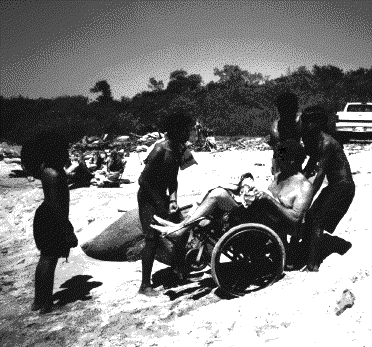
The difference is that José was a poor field worker in the poorest part of Mexico. There is no government help or support system for the permanently disabled, and there is no insurance to help a family deal with such a severely paralyzed man.
They let him stay at the local hospital for a couple of months until his lungs were working properly; then, with practically no rehabilitation training, shipped him home to his wife and one-year-old son.
Some of his friends have decided to help José get a ramp. We want him to be able to get in and out of his house and down to the road below without being toppled out of his wheelchair, which --- he tells us with no small amusement --- has happened several times.
For $300 we figure we can build a pathway that will get rid of the humps and bumps and make it possible for his wife to get him down to the street without braining him in the process.
I knew José slightly before the accident. He was funny, innocent, unworldly --- but quite a boozer. He's changed now. His face is sharper than it used to be. He looks a bit like a young Samuel Beckett, may even share --- unbeknownst to him --- some of his dark philosophy. Like, "I can't go on. I'll go on."
When I visited José last week, we talked easily of this and that --- of his two children (one born eighteen months after the accident), of his wife (a good lady) and our plans for the ramp and for fixing the roof over his bedroom so he doesn't get rained on when the wet season starts in July.
José lives with his extended family in a compound that is a collection of four palapa huts -- made mostly of saplings, driftwood and palm fronds. There are six brothers and sisters, with their assorted wives and husbands. There are also 10 young nephews and nieces -- and several more on the way. During the course of our conversation, at any one time, at least two of the children are sitting on his lap, or climbing up and down the wheels of his wheelchair, trying merrily to distract him from his conversation.
I know that if José were in the United States, he would have --- at the very least --- up-to-date equipment to help him survive. Perhaps he would have a car; perhaps --- if he could badger the Supplemental Security Income people into being generous for a change --- he would have personal care attendants to help him in and out of bed, to turn him, to clean him up, to feed him.
On the surface, his situation here is terrible. There's no government dole. He has no rehabilitation equipment at all. There is no easy way in or out of the house. He has nothing other than a wheelchair and a towel tied around his chest to keep him from falling over. He has no trained help.
And yet I am wondering if he is better or worse off than his quadriplegic brothers and sisters in the U.S. He is never alone, has dozens of pairs of helping hands, day or night. There is always someone to feed him, to move him from here to there, tend to him, talk to him, play chess with him.
His brothers help him get in and out of the house; his wife, children and nieces help to clean him up; and when his own children grow to the age where they will start school, there will be a half a dozen more to care for him.
José lives on one-thousandth of the budget of the average spinal-cord-injured person in the United States, and probably a millionth of the budget of Reeve. Like Reeve, there is an easiness to him, a brightness, that hope in face of absolute disaster.
But, unlike for most of the SCIs to the north there's a lively bunch around José day and night, dozens of family and friends always there, always at the ready. The "freedom" for the disabled that we push in the United States --- with all our independent living centers --- has a price. That price is loneliness. One has only to visit the online chat rooms of the SCI to see the heartbreak of those who have learned how to be powerfully self-sufficient and, as part of their independence, often live alone (except for paid help).
The coming of a disability not only cripples the individual but the whole family. It's almost a cliché in the United States that a physical disaster like this will destroy the marriage of those younger than thirty-five. In one frank account in Spinal Network, a young woman explained why she was leaving her SCI husband: "It just wasn't in our marriage vows that I had to feed him, clean up after him, do his 'bowel program.'"
That attitude seems to be something peculiar to post-industrial society. Whatever it is that the very poor have (in what we often call "the backward countries") --- mute acceptance, religious fatalism, willingness to put up with family no matter how pained --- something strange and wonderful has protected José and those around him from being destroyed by his unhappy accident.